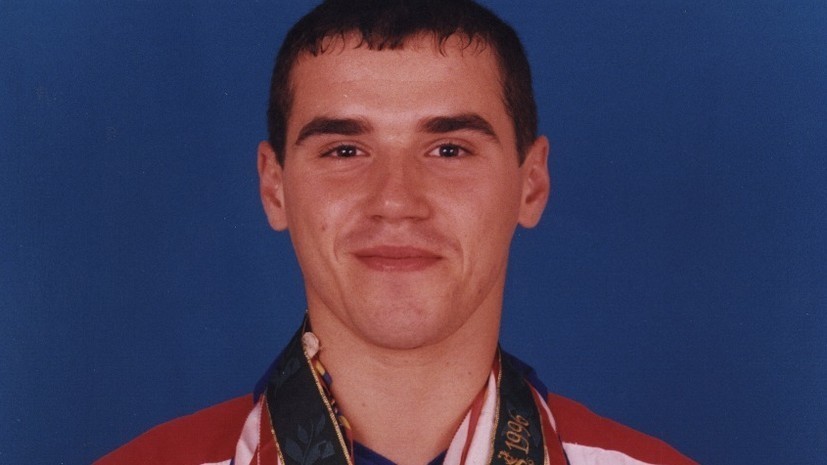On the evening of November 4, the famous gymnast Alexei Nemov told the sports fans the sad news. The 1996 Olympic champion in the team championship Dmitry Vasilenko, with whom Nemov played for the Russian national team, died after a long illness. The athlete was 43 years old.
"Goodbye my friend! Thanks for all. Dima is no longer with us. May he rest in peace. Thanks to everyone who prayed for his health. Now we can only pray for his soul. Our condolences to relatives and friends, ”Nemov wrote on Instagram.
Later, Vasilenko’s death was confirmed in the Russian Gymnastics Federation. The organization also expressed condolences to the athlete’s family and friends.
Vasilenko died in France after 11 years of struggle with a rare but serious illness - amyotrophic lateral sclerosis (ALS). This incurable disease leads to paralysis and muscle atrophy. As a rule, death from ALS occurs due to failure of the respiratory muscles and the inability to breathe independently.
Vasilenko began his sports career in his native Cherkessk in the Karachay-Cherkess Republic. In the North Caucasus, gymnastics is not very popular, but the fate of young Dmitry was determined by the case. When the boy was five years old, the well-known trainer in the region, Alexander Kudinov, moved to the entrance of his house. He noticed a little boy climbing trees, and called into the gym.
Vasilenko began to achieve success early and quickly got into the new Russian team, formed after the collapse of the USSR. He could show equally good results in all types of programs, but most of all he specialized in floor exercises. In them, he became the silver medalist of the European Championships in 1994. In the fall, at the World Championships, Vasilenko took second place in the team championship.
The main event in the sports life of a gymnast from Karachay-Cherkessia was the 1996 Olympic Games. He turned out to be one of seven athletes selected for the men's gymnastics team. In the team championship, which also served as a qualification for certain species, Vasilenko performed in all exercises except the crossbar. All the points he earned were eventually credited to the national team and helped to win gold, bringing victory over last year's world champions from China. Vasilenko did not play in personal finals, although he became the seventh in the qualification of floor exercises, but then Alexey Nemov and Alexey Voropaev were higher than him.
Thus, Vasilenko became the first and still the only Olympic champion from his republic. According to the memoirs of Alexander Dzhemakulov, who studied in the same room as Dmitry, and now heads the school of gymnastics in Cherkessk, they met the Olympic champion at a high level.
“Vasilenko was honored in the government house in the presence of President Vladimir Khubiev, he showed a medal, told how he won it. Dmitry was given a large number of gifts, handed an apartment, a car. For us it was a big celebration that he became the Olympic champion, ”said Dzhemakulov RT.
After the Olympics, Vasilenko moved to Lille at the invitation of the local gymnastics club, in which he was both an active athlete and coach. Later he returned to Russia to prepare for the next Olympics and even entered the final team, but at the last moment he was transferred to the category of substitutes. Vasilenko again left for France and did gymnastics there until 2005.
After completing a career in the Vasilenko family, a disaster happened - his 17-month-old daughter died from a sudden cardiac arrest. Soon, the former gymnast began to limp, and in 2008, doctors made a terrible diagnosis of ALS, which confined him to a wheelchair.
“After leaving for France, Dmitry returned to his parents, we continued to be very friendly. He was a very lively person, until the last he fought with the disease. When he could still talk, he told me on the phone: “I am not sick, I am not disabled,” he promised to get better. He did not fully believe in the worst and did not let others believe in it, although he was seriously ill, ”said Dzhemakulov.
In the same year, Vasilenko passed an examination in Germany. He was told that treatment was impossible and only three years left to live, but their prognosis was inaccurate. The former gymnast lived another 11 years, although his condition continued to deteriorate. In recent years, he lost the opportunity to talk independently, but thanks to special equipment he began to use a computer with his eyes and thus continued to communicate.
“As a person, Vasilenko was always kind and responsive, he was always a team player, he was sick and worried about the development of gymnastics in the Karachay-Cherkess Republic. He fought for this sport to be popularized in the region, ”Dzhemakulov added.

